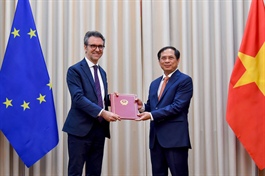Amended investment law to relieve funding burdens
Amended investment law to relieve funding burdens
With the strategic plan to attract qualified foreign investment into Vietnam in the light of the Politburo’s Resolution No.50-NQ/TW, the drafted amendment of the Law on Investment 2014 simplifies licensing procedures for setting up a foreign-invested entity. Nguyen Hung Quang, and Le Gia Khanh, lawyers at law firm NHQuang&Associates, write about the impacts on overseas investors in the country.

Nguyen Hung Quang, and Le Gia Khanh, lawyers at law firm NHQuang&Associates
|
The Law on Investment 2014 requires that before establishing a business entity, a foreign investor must demonstrate a project and apply for an investment registration certificate (IRC) in accordance with the procedures of this law, and satisfy the following conditions (Article 22, Clause 1). After receiving an IRC, the financier continues to apply for an enterprise registration certificate (ERC). Holding such a certificate, they can start to do business through the newly-established enterprise. The Politburo’s Resolution No.50-NQ/TW released last August on orientations to perfect mechanisms, policies, raise quality and efficiency of foreign investment by 2030 lays down some missions for foreign direct investment (FDI) attraction, such as: (i) revising procedures and conditions in order to guarantee fair treatment between domestic and foreign investors and international commitments; (ii) overcome the situation of weak capital; and (iii) encouraging foreign backers to join markets in sectors and fields that are not required to be protected. In order to legislate for these policies, the draft amendment of the Law on Investment revises provisions relating to licensing procedures.
Requirement removal
The amendment draft removes the requirement for an IRC for innovative startup enterprises and investment funds in compliance with the legislation on support to small- and medium-sized enterprises. According to the draft, an innovative startup project is one that implements ideas based on exploitation of intellectual property, technology, and new and rapid growth business models. Some independent reports show that Vietnam together with Singapore, Indonesia, and Malaysia has become the most active innovative startup investment markets in Southeast Asia. The reports estimate that the total value of private investment transactions in the Vietnamese market in 2018 reached $1.6 billion. Currently, the Ministry of Planning and Investment is seeking public opinion on the draft national strategy on the Fourth Industrial Revolution to 2030. This change of amendment draft will support actualisation of the draft strategy.
Supplementing regulations
The amendment draft supplies several opportunities for foreign investors to revise the IRC before establishing new enterprises. This supplement is provided in both articles of the amendment draft, Article 23 and Article 42. Accordingly, the investor can revise the IRC with their purpose before continuously applying for the ERC, while the 2014 law does not clearly refer to the matter. The change makes the law clearer and creates opportunities for overseas funders to offer more investment capital after holding the IRC.
The amendment draft also provides in the direction of clearly separating circumstances for the revision of IRC and approval on investment policies, corresponding to the right to amend the project (Article 42, clause 1). Accordingly, if the project amendments lead to the change of contents of the IRC, the investor shall carry out legal procedures for IRC amendment. In case the project was already get the approval on investment policy, and it now falls under the circumstances in Article 42, Clause 3 such as change of investment purpose, scale of land use over 10 per cent or over 30 hectares, location, investment capital from 20 per cent or more, investment progress from 12 months or more, investment term, investment technology, or investor(s), it must be applied for approval of such amendments. This supplement affects on both foreign and domestic investors and make more transparency of the criteria and more convenience of the procedures for investors.
Obtaining approval
As mentioned, the draft amendment maintains two layers of approval for FDI projects which exist in the 2014 law, the IRC and ERC. Large-scale projects or other special ventures which strongly impact the environment, such as casinos and golf courses, must get approval on investment policy from the National Assembly (NA), government, or provincial people’s committee, depending on the scale and category of the scheme.
However, the amendment draft clarifies the concept of “approval on investment policy”. It is an approval from a competent authority on the project’s purpose, location, progress, term, mechanism on investor selection, and other special mechanisms and policies (if any) (Article 3, Clause 1 of the draft). In addition are the principles, criteria, and conditions to apply each mechanism of investor selection to implement projects using land, auction of land use rights, bidding (Article 30).
The draft also provides clear competence on approving the investment policies of the NA, government, and provincial people’s committees (articles 31, 32, and 33). These provisions seem to unify with other laws related to housing, planning, and environmental protection, and resolve the overlap between relevant procedures and respective laws.
Moreover, the approval mechanism on investment policies is more decentralised to localities which simplifies and reduces administrative steps. Besides the supplement of cases in order to protect public interests, the tendency of the amendment draft is to narrow the scope of investment projects to be required to get such approval. For example, only projects of VND10 trillion ($434.8 million) or more will be submitted to the prime minister instead of VND5 trillion ($217.4 million) as per the 2014 law. Also, the draft simplifies requirements on application dossier to get approval on investment policy. It reduces compliance costs for the investors, and removes obstacles for “eagle” investors in both large and special projects.


















